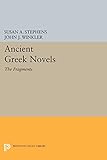Ancient Greek Novels : The Fragments: Introduction, Text, Translation, and Commentary / ed. by John J. Winkler, Susan A. Stephens.
Material type: TextSeries: Princeton Legacy Library ; 254Publisher: Princeton, NJ : Princeton University Press, [2014]Copyright date: ©1995Edition: Course BookDescription: 1 online resource (558 p.)Content type:
TextSeries: Princeton Legacy Library ; 254Publisher: Princeton, NJ : Princeton University Press, [2014]Copyright date: ©1995Edition: Course BookDescription: 1 online resource (558 p.)Content type: - 9780691608846
- 9781400863389
- 883/.0108 23
- online - DeGruyter
- Issued also in print.
| Item type | Current library | Call number | URL | Status | Notes | Barcode | |
|---|---|---|---|---|---|---|---|
 eBook
eBook
|
Biblioteca "Angelicum" Pont. Univ. S.Tommaso d'Aquino Nuvola online | online - DeGruyter (Browse shelf(Opens below)) | Online access | Not for loan (Accesso limitato) | Accesso per gli utenti autorizzati / Access for authorized users | (dgr)9781400863389 |
Browsing Biblioteca "Angelicum" Pont. Univ. S.Tommaso d'Aquino shelves, Shelving location: Nuvola online Close shelf browser (Hides shelf browser)

|

|

|

|

|

|

|
||
| online - DeGruyter The Age of Grace : Charis in Early Greek Poetry / | online - DeGruyter Tacitus and the Tacitean Tradition / | online - DeGruyter The Shield of Homer : Narrative Structure in the Illiad / | online - DeGruyter Ancient Greek Novels : The Fragments: Introduction, Text, Translation, and Commentary / | online - DeGruyter The Battle of the Gods and Giants : The Legacies of Descartes and Gassendi, 1655-1715 / | online - DeGruyter Taoist Ritual and Popular Cults of Southeast China / | online - DeGruyter Retirement of Revolutionaries in China : Public Policies, Social Norms, Private Interests / |
Frontmatter -- CONTENTS -- PREFACE -- LIST OF PAPYRI -- ABBREVIATIONS -- General Introduction -- PART I. NOVEL FRAGMENTS -- PART II. AMBIGUOUS FRAGMENTS -- APPENDIXES -- BIBLIOGRAPHY -- INDEX OF PASSAGES CITED -- INDEX OF PROPER NAMES FROM THE FRAGMENTS AND TESTIMONIA -- GENERAL INDEX
restricted access online access with authorization star
http://purl.org/coar/access_right/c_16ec
The recent discovery of fragments from such novels as Iolaos, Phoinikika, Sesonchosis, and Metiochos and Parthenope has dramatically increased the library catalogue of ancient novels, calling for a fresh survey of the field. In this volume Susan Stephens and John Winkler have reedited all of the identifiable novel fragments, including the epitomes of Iamblichos' Babyloniaka and Antonius Diogenes' Incredible Things Beyond Thule. Intended for scholars as well as nonspecialists, this work provides new editions of the texts, full translations whenever possible, and introductions that situate each text within the field of ancient fiction and that present relevant background material, literary parallels, and possible lines of interpretation.Collective reading of the fragments exposes the inadequacy of many currently held assumptions about the ancient novel, among these, for example, the paradigm for a linear, increasingly complex narrative development, the notion of the "ideal romantic" novel as the generic norm, and the nature of the novel's readership and cultural milieu. Once perceived as a late and insignificant development, the novel emerges as a central and revealing cultural phenomenon of the Greco-Roman world after Alexander.Originally published in 1995.The Princeton Legacy Library uses the latest print-on-demand technology to again make available previously out-of-print books from the distinguished backlist of Princeton University Press. These editions preserve the original texts of these important books while presenting them in durable paperback and hardcover editions. The goal of the Princeton Legacy Library is to vastly increase access to the rich scholarly heritage found in the thousands of books published by Princeton University Press since its founding in 1905.
Issued also in print.
Mode of access: Internet via World Wide Web.
In English.
Description based on online resource; title from PDF title page (publisher's Web site, viewed 30. Aug 2021)


